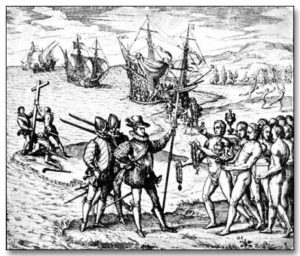 Who among us of a certain age can hear the name Christopher Columbus without reciting the opening lines of the doggerel poem “In 1492”? Reportedly written by a teenager named Winifred Sackville Stoner a hundred years ago, it begins like this: “In fourteen hundred and ninety-two, Columbus sailed the ocean blue.” There are other lines, perhaps not as familiar. To wit: “The Arakawa natives were very nice; They gave the sailors food and spice. Columbus sailed on to find some gold, To bring back home, as he’d been told.”
Who among us of a certain age can hear the name Christopher Columbus without reciting the opening lines of the doggerel poem “In 1492”? Reportedly written by a teenager named Winifred Sackville Stoner a hundred years ago, it begins like this: “In fourteen hundred and ninety-two, Columbus sailed the ocean blue.” There are other lines, perhaps not as familiar. To wit: “The Arakawa natives were very nice; They gave the sailors food and spice. Columbus sailed on to find some gold, To bring back home, as he’d been told.”
The poem rhymes well. Parts of it are even true. It just doesn’t tell the whole story.
To get to the bottom of why there’s swelling momentum to replace Columbus Day, which is tomorrow, with Indigenous People’s Day, I reread the first chapter of Howard Zinn’s counter-culture classic “A People’s History of the United States.” Published in 1980, this wonderful book has sold in excess of two million copies and been translated into more than 20 languages. It changed the way millions of people think about history by telling it “bottom-up.”
Zinn was born in 1922 to Jewish immigrant parents. He grew up hard on the mean streets of Brooklyn. “My parents worked all their lives as common laborers,” Zinn said. “We were always just one step ahead of the landlord.” Though raised in a home with no books, Zinn became a voracious reader who eventually earned degrees from New York University and Columbia.
He served as a bombardier in World War II and became convinced afterward that there could no longer be such a thing as a just war because the vast majority of victims in modern warfare are civilians. “If we’d had a union during the war,” he once said, “maybe we’d have gotten together and asked why are we dropping bombs on this peaceful village this morning?” As a professor at Spelman College, a historically black women’s school, Zinn became active in the civil rights movement. He also joined in protests against the war in Vietnam. His life’s work, which included writing dozens of books in addition to teaching at both Spelman and Boston University, focused on race, class and war. History should not be written from the point of view of governments, conquerors and diplomats, he believed, but through the eyes of those who struggled for justice, equality and power.
It should come as no surprise that Howard Zinn was no fan of Christopher Columbus. When the Arawak “Indians” swam out to meet the Nina, Pinta and Santa Maria on October 12, 1492, they did it with the friendliest of intentions. They provided their guests with food, water and gifts, prompting Columbus to write in his ship’s log: “They do not bear arms and do not know them…we could subjugate them all and make them do whatever we want.”
What he wanted, of course, was gold. “We can bring you as much gold as you need and as many slaves as you ask,” he promised Spanish authorities.
Columbus’s determination to keep these promises led to the eventual obliteration of the Arawak people. Some of them were brutally murdered. Some were worked to death. Many starved or died by suicide. Others succumbed to European diseases for which they had no immunity. When Columbus arrived in the Caribbean, at least a million (and perhaps several million) native people lived there. By 1550, that number had been reduced to 500. A century later, not one Arawak remained.
That’s one of the many reasons why the idea of a day to honor indigenous people rather than Christopher Columbus was hatched in 1979 in South Dakota. For too long, most Americans knew only the whitewashed tale of “brave and bright” Christopher Columbus. It’s high time we learned the other side of the story.
(October 13, 2019)